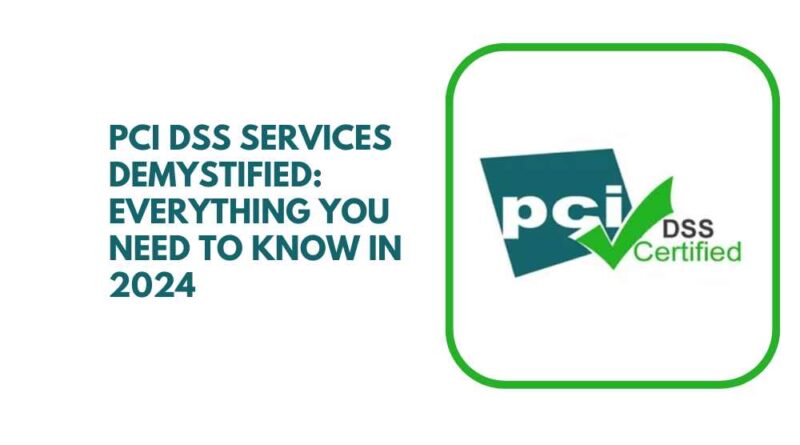PCI DSS Services Demystified: Everything You Need to Know in 2024
Protecting sensitive data is more crucial than ever. With cyber threats evolving constantly, businesses need robust measures to safeguard their customers’ payment card information. This is where PCI DSS (Payment Card Industry Data Security Standard) services come into play. In this comprehensive guide, we’ll delve into everything you need to know about PCI DSS services in 2024.
Understanding PCI DSS
PCI DSS is a set of security standards designed to ensure that all companies that accept, process, store, or transmit credit card information maintain a secure environment. These standards are established by the Payment Card Industry Security Standards Council (PCI SSC), which includes major credit card companies like Visa, Mastercard, American Express, Discover, and JCB.
Why PCI DSS Matters
Protecting cardholder data is not just about compliance; it’s about building trust with customers. A data breach can have severe consequences, including financial losses, reputational damage, and legal ramifications. By complying with PCI DSS, businesses demonstrate their commitment to security and reduce the risk of breaches.
Who Needs PCI DSS Compliance?
Any organization that accepts credit card payments, regardless of size or industry, must comply with PCI DSS requirements. This includes retailers, e-commerce websites, financial institutions, healthcare providers, and service providers that handle cardholder data on behalf of other businesses.
Types of PCI DSS Services
PCI DSS compliance can be a complex process, requiring specialized knowledge and expertise. Fortunately, there are various services available to help businesses navigate this landscape effectively.
1. Compliance Assessments
PCI DSS compliance assessments involve evaluating an organization’s adherence to the PCI DSS requirements. This may include reviewing policies and procedures, conducting vulnerability scans, and performing penetration testing to identify potential security weaknesses.
2. Remediation Services
If an organization fails to meet PCI DSS requirements, remediation services can help address deficiencies and implement necessary changes to achieve compliance. This may involve updating security policies, implementing new technologies, or providing employee training.
3. Managed Security Services
Managed security service providers (MSSPs) offer ongoing support to help organizations maintain PCI DSS compliance. This may include 24/7 monitoring, incident response, and security updates to address emerging threats and vulnerabilities.
4. Encryption Solutions
Encryption plays a critical role in protecting cardholder data from unauthorized access. Encryption solutions help organizations encrypt sensitive information both at rest and in transit, ensuring that even if data is compromised, it remains unreadable to unauthorized parties.
5. Tokenization Services
Tokenization replaces sensitive cardholder data with unique tokens, reducing the risk associated with storing and transmitting payment information. Tokenization services help organizations implement tokenization effectively and integrate it into their payment processing systems.
Benefits of PCI DSS Services
Investing in PCI DSS services offers several benefits beyond compliance.
1. Enhanced Security
By implementing PCI DSS-compliant security measures, organizations strengthen their defenses against cyber threats, reducing the risk of data breaches and fraud.
2. Improved Reputation
Demonstrating PCI DSS compliance builds trust and credibility with customers, partners, and stakeholders, enhancing the organization’s reputation and competitive advantage.
3. Cost Savings
Preventing data breaches can save organizations millions of dollars in potential fines, legal fees, and remediation costs associated with non-compliance.
4. Peace of Mind
Knowing that sensitive data is protected according to industry best practices provides peace of mind for business owners and executives, allowing them to focus on core business objectives.
Challenges of PCI DSS Compliance
While PCI DSS services offer significant benefits, achieving and maintaining compliance can present challenges for organizations.
1. Complexity
PCI DSS compliance requirements are comprehensive and can be complex to interpret and implement, especially for organizations with limited resources or technical expertise.
2. Cost
Compliance efforts can incur significant costs, including investments in technology, personnel, and third-party services, which may strain budgets, particularly for small businesses.
3. Evolving Threat Landscape
Cyber threats are constantly evolving, requiring organizations to stay vigilant and adapt their security measures to address new vulnerabilities and attack vectors.
4. Resource Constraints
Smaller organizations may lack the resources and dedicated staff needed to effectively manage PCI DSS compliance, increasing their vulnerability to security breaches.
Conclusion
PCI DSS services play a vital role in helping organizations protect sensitive payment card information and maintain compliance with industry regulations. By understanding the importance of PCI DSS compliance, leveraging the right services, and addressing challenges effectively, businesses can mitigate risks, enhance security, and build trust with their customers in 2024 and beyond.
Note :- For more stories and info like this, www.techybusinesses.com is the place to be.

